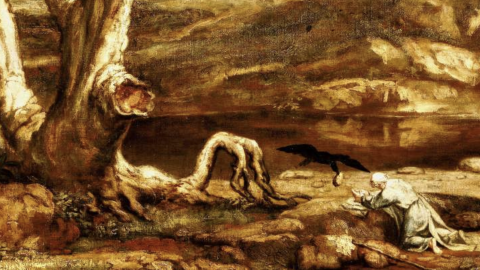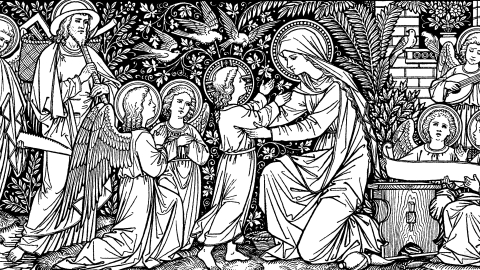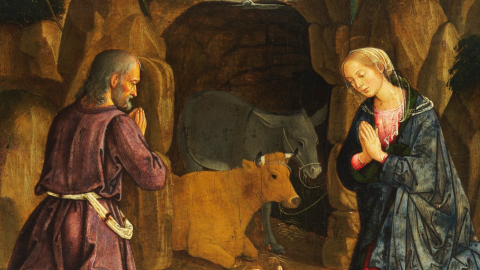Epidemics are Good for Us

Image credit: pixabay.com (free for commercial use).
May this article help us see that Providence wants some good to come out of this difficulty in which we find ourselves today. God has never allowed evil without ensuring a good comes out of it. Incredible, but true! God is a father who cares immensely for his children. And being infinitely more capable than human fathers, he can do what men cannot; he can always write straight with crooked lines - and does so. He can always turn evil happenings, the mistakes we make, even the sins we commit, into something beneficial - and does so if we let Him.
Epidemics and the Rapid Growth of Christianity
In the year 165 AD a terrifying epidemic arose. No one was immune to its contagion, and therefore at a rapid pace it destroyed at least a quarter, but as much as an entire third of the population of the whole Roman Empire. It is surmised that this could have been the first appearance of smallpox in the West.
Less than a century later, an equally terrible epidemic again struck the world of the Romans. “Out of the blue,” wrote St. Dionysius, “came this disease, a thing more frightful than any disaster whatever.” When it was at its worst, five thousand people a day died in the city of Rome alone. Carts carried off loads of bodies piled high. Even the lives of the greatest men were not spared: Marcus Aurelius himself, Emperor of the Roman People though he was, was stricken with the pestilence and died.
It may seem shocking to say this, but it can be argued that these calamities were beneficial to the Christian cause. If these had not happened, the Christian faith would not have grown nearly as fast as it did.
Why can we say this?
The First Reason: Paganism Could Not Explain Epidemics Sufficiently
There are two main reasons. The first of these stems from the fact that there was a crisis deeper than any crisis of health, and this was a crisis on the level of faith. The pagan belief of the time could not explain the epidemic sufficiently. The pagan priests admitted that they were ignorant of the reasons of the sickness. Why did the gods send it? They didn’t know. Did the gods even care? They didn’t even have an answer to that! This would be very frightening to a society with no scientific explanation of sicknesses such as these. They knew nothing of bacteria, nothing of viruses. If a system is lacking a true explanation for the existence of evil, you will be little motivated to continue in your adherence to that system during the presence of great evils such as the epidemics were.
Christianity, on the other hand, could give a reason for the appearance of the epidemics. An early bishop and martyr, St. Cyprian, writing to his flock at the time of the second epidemic, told them that the disease helps one to gain virtue. He wrote that it
“searches out the justice of each and every one and examines the minds of the human race; whether the well care for the sick, whether relatives dutifully love their kinsmen as they should, whether masters show compassion for their ailing slaves, whether physicians do not desert the afflicted…”
Challenging times set apart the good from the bad. They point out who is pleasing to God and who is displeasing. “The just,” said Cyprian, “are called to refreshment, the unjust are carried off to torture.” The former are urged to persevere, the latter to convert.
The epidemic was a tremendous occasion to acquire the valuable virtue of fortitude. St. Cyprian admitted that “we have begun gladly to seek martyrdom while we are learning not to fear death. These are trying exercises for us, not deaths; they give to the mind the glory of fortitude.” When one is urged by the example of Christ to help one’s neighbor even at the risk of death, the continued efforts that are made increase the virtue of fortitude. When one is urged by a higher motive to spurn death, the fear of death grows less and less – and the desire of heaven through martyrdom more easily germinates in the heart. It is to be remembered that these times of early Christianity were times of frequent persecution, and martyrdom was not far away from anyone.
St. Dionysius, an early bishop of Alexandria, showed that the epidemic gave rise to the virtue of hope. Only those with faith in Christ know for certain of eternal life and reach out for it by the virtue of hope. Paganism knew no such thing, and so fell into despair. Dionysius’ attitude would have shocked these pagans. “Other people would not think this is a time for festival,” he wrote, but “far from being a time of distress, it is a time of unimaginable joy.” Only the Christian knew that those who died in the love of Christ would reach the unending joy of heaven; this filled him with an anticipatory joy and steeled him for the struggle against fear amidst those times filled with death.
The Second Reason: Christianity's Ability to Deal with Epidemics
The second main reason was that Christianity was better able to cope with the crisis and so had higher rates of survival. Christ had given his church the tools necessary to deal with any evil, and these epidemics were no exception.
Paganism, it must be noted, had no ethical standard built into it. Christianity did, and in this regard it held sacred the words of Christ: “Love one another as I have loved you.” Thus when Christians saw fellow men suffering from a disease, infectious though it was, they personally brought them aid. Dionysius writes:
“Most of our brother Christians showed unbounded love and loyalty, never sparing themselves and thinking only of one another. Heedless of danger, they took charge of the sick, attending to their every need and ministering to them in Christ, and with them departed this life serenely happy; for they were infected by others with the disease, drawing on themselves the sickness of their neighbors and cheerfully accepting their pains. Many, in nursing and curing others, transferred their death to themselves and died in their stead…. The best of our brothers lost their lives in this manner, a number of presbyters, deacons, and laymen winning high commendation so that death in this form, the result of great piety and strong faith, seems in every way the equal of martyrdom.”
St. Dionysius points out that while all were affected by this epidemic, the pagans bore the brunt of the fatalities. He pointed out the reason why. The Christians, as we saw above, generously nursed both pagan and fellow-Christian alike. However, Dionysius notes,
“The heathen behaved in the very opposite way. At the first onset of the disease, they pushed the sufferers away and fled from their dearest, throwing them into the roads before they were dead and treated unburied corpses as dirt, hoping thereby to avert the spread and contagion of the fatal disease; but do what they might, they found it difficult to escape.”
A sad example of this sort of behavior is found in a pagan individual that should have been the last to act in this way, a doctor. Galen was one of the most famous of classical physicians, but he has not even left us a complete description of the disease. This was on account of the fact that as soon as the epidemic hit, he cleared out of Rome, retiring to an estate in the outreaches of the empire until the danger had passed.
This way of acting had its consequences, and surprising ones at that! The different modes of morality led to very different rates of mortality. When it comes down to it, if the sick were left alone and received not even the most elementary care, they were much more likely to die. This was the unfortunate case with many of the pagans. Now if the basic needs of life, such as food and water, are given to the sick, they stood a much greater chance of surviving. Now this latter case was that of the sick people attended to by the courageous Christians. Relative to the pagan population, therefore, many more of the Christians survived.
In a book which is more science than religion, the sociologist Rodney Stark gives some speculative figures that give us a sense of just how much these epidemics affected the growth of Christianity. He says, in essence, the following.
In the year 160, just before the first of the epidemics in question, 0.4 percent of the population of the Roman Empire was Catholic. This roughly comes to 1 out of every 250 people.
Now with a higher survival rate during the epidemics, the Christian population would have grown relative to the pagan population. Not only this, but the good example set by these brave souls would have had its effects. Even on a natural level, many pagans who were nursed to health by Christians would have ended up indebted to the same. Many pagan families or individuals would have gained some sort of attachment to Christians. This would have led to friendships, marriages, and especially conversions. As a result, after the second epidemic in 260 AD the Christian population in the empire would probably have grown to be 1 out of every 5 people! And had the epidemics not happened, the number would have been only 1 out of every 9!
These were terrifying realities, these epidemics. But what a tremendous side-effect! The Christians of the time certainly weren’t aware of how crucial these epidemics would be to their expansion within the Roman Empire. But was this not the plan of Providence? What a lesson! God uses the evils of the world, awful as they are, to bring about good. Yes, many people died on account of the epidemics, but how many more people in the world were brought the hope, the fortitude, and the self-effacing love that goes along with the Christian faith!
(The information in this article was summarized from a chapter in Rodney Stark’s book, The Rise of Christianity. This article is not an endorsement of any of the author’s views expressed in said book.)





